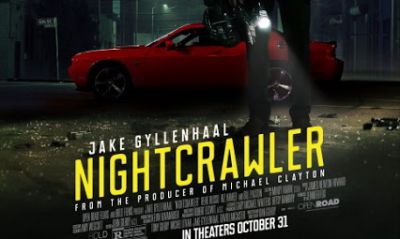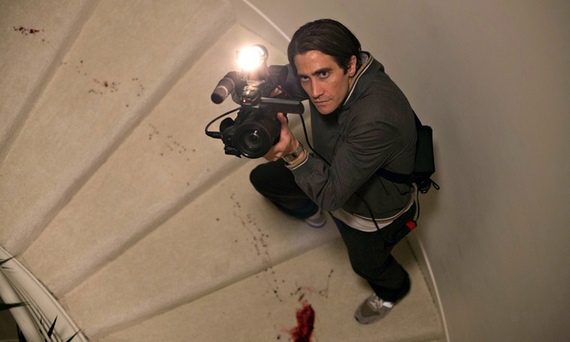
 Nightcrawler: Most overhyped film of the year?
Nightcrawler: Most overhyped film of the year?
Other | Tuesday 25th November 2014 | Matt
Currently rocking a lofty 94 per cent on Rotten Tomatoes (that's one point below 2001: A Space Odyssey and four behind Taxi Driver), you could be forgiven for thinking that writer/director Dan Gilroy's Nightcrawler is a piece of truly vital genre film making. That's assuming you haven't actually seen it.
Cast against the backdrop of a seemingly perpetual L.A midnight, where the neon is as omnipresent as the moral degradation, Nightcrawler takes as its subject matter the seedy world of freelance urban reportage, as groups of camera jockeys compete against each other to capture the most gruesome, and therefore newsworthy, images from stories around the town. Car crashes, armed robberies, fire, murder, the titular nightcrawlers have no scruples when it comes to getting up close and personal with the most abject of human tragedy. It's through this miasma of the unsavoury that Lou Bloom, played by Jake Gyllenhaal, finds his economic salvation.
When we're first introduced to Lou he's stealing scrap metal for cash, and socking the occasional security guard by necessity. After coming across a crime scene, Bloom crosses paths with a freelance camera crew attempting to cover the story. Pressing one of the cameramen, Joe (Bill Paxton), for information on their vocation, it turns out that there's a substantial living to be made chasing grisly scenes and selling the footage on to the highest bidding local news stations. Bloom recognises in the figure of the nightcrawler a true calling, a vocation that combines his two chief character traits: a sociopathic disregard for human suffering and a deep love of cold hard cash.
After acquiring a crappy video camera and hiring an intern, Rick (Riz Ahmed), to track police calls across the city and keep the pair ahead of the game, Lou strikes up a working relationship with Nina (Rene Russo), an aggressively pragmatic local TV news editor keen to take her paltry station to the top of the ratings chart. Buoyed by the oft repeated adage "If it bleeds, it leads", Bloom sets about working his way up the ranks of the nighcrawlers, quickly outstripping Joe and his colleagues through sheer single mindedness and an unwavering commitment to capturing only the most grotesque stories, by any means necessary.
Lou Bloom is a fascinating character, and Gyllenhaal excels in conveying the latent nervous energy behind his impassive façade. In conversation Bloom has a distinct sense of uncanny valley about him; making seemingly all the right moves, presenting himself with a blasé confidence straight out of a management training video: "I'm a hard worker. I set high goals. My motto is, if you wanna win the lottery, you have to make the money to buy a ticket."

There's more than a whiff of Travis Bickle to Gilroy's creation, and both are outcasts on the fringes of society whose attempts at normalcy are thwarted by a brutal, uncaring city. However, whilst many critics have made much of this passing similarity, unlike Scorsese, Gilroy makes no attempt to gesture towards the societal or environmental background to Bloom's alienation. If we indulge this comparison between DeNiro's iconic sociopath and Gyllenhaal's creepy outcast, it quickly becomes apparent that, despite Gyllenhaal's stellar performance, the resemblance is barely more than skin deep.
There is none of the profound sense of psychological wounding that serves to anchor us to Bickle throughout his misguided campaign of ostensibly moral violence, no subtle nod towards the deleterious and dehumanising effects of the urban space. Instead we are left with a man, maybe a sociopath, maybe a particularly sadistic misanthrope, who embodies the voyeuristic impulse of the news media that Gilroy vilifies. If the message seems somewhat self evident (excessive portrayals of real life violence? Bad!) that's understandable, given that the gamut of films exploring these themes is pretty vast, and the film's central attack on the "if it bleeds it leads" cutthroat mentality would be frankly rather trite were it not for the increasingly grisly actions of Nightcrawler's central protagonist.
Apparently Gilroy is unable to appreciate the irony inherent in this problem: if he must continuosly indulge the most base and voyeuristic impulses of his audience by pushing his character to commit more and more egregious acts, in order to make a point about other media doing the same thing, where does Nightcrawler sit on his own moral spectrum? Given that the chief criticism he levels at the industry is essentially a moral one, the film is inevitably rather a one note affair.
Had Gilroy the self awareness to identify the same impulse in his own industry, and, by extension, his own filmmaking, and maybe offer some wry exploration of this wider theme, then Nightcrawler would truly be the subversive excoriation that the director seems to have intended it to be. As such though, the lacklustre mise en scene and general failure of the camerawork to rise above mere competence means that outside the film's central performance, there is little to recommend the picture to the serious film fan.
As a schlock thriller, Nightcrawler provides ample fun. But let's not pretend it's more than it is.
